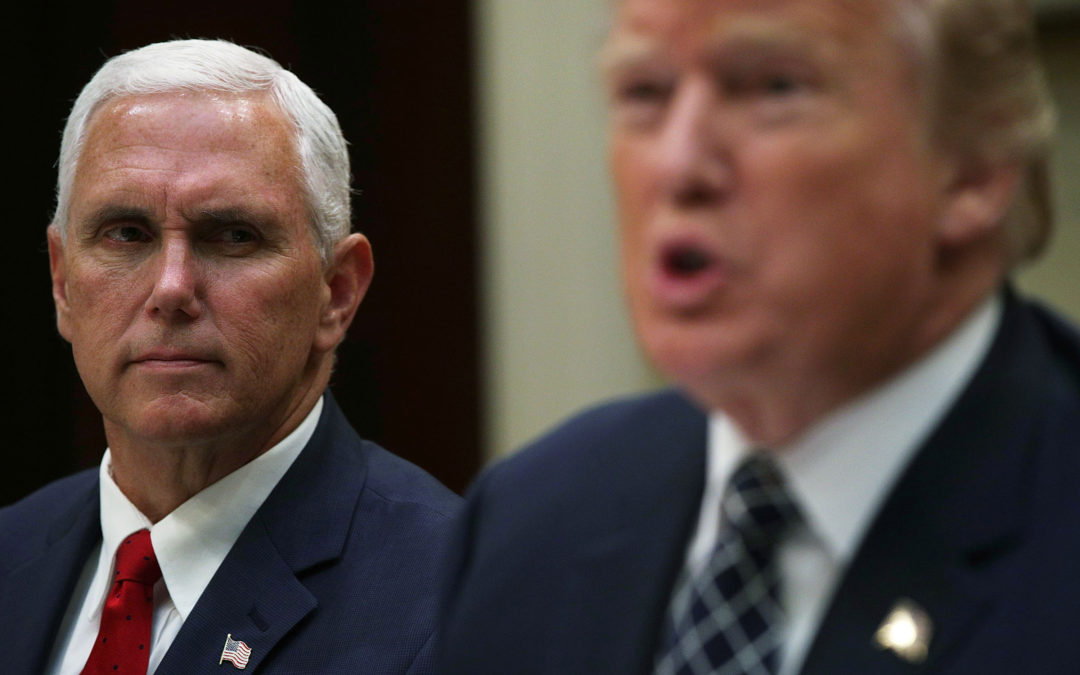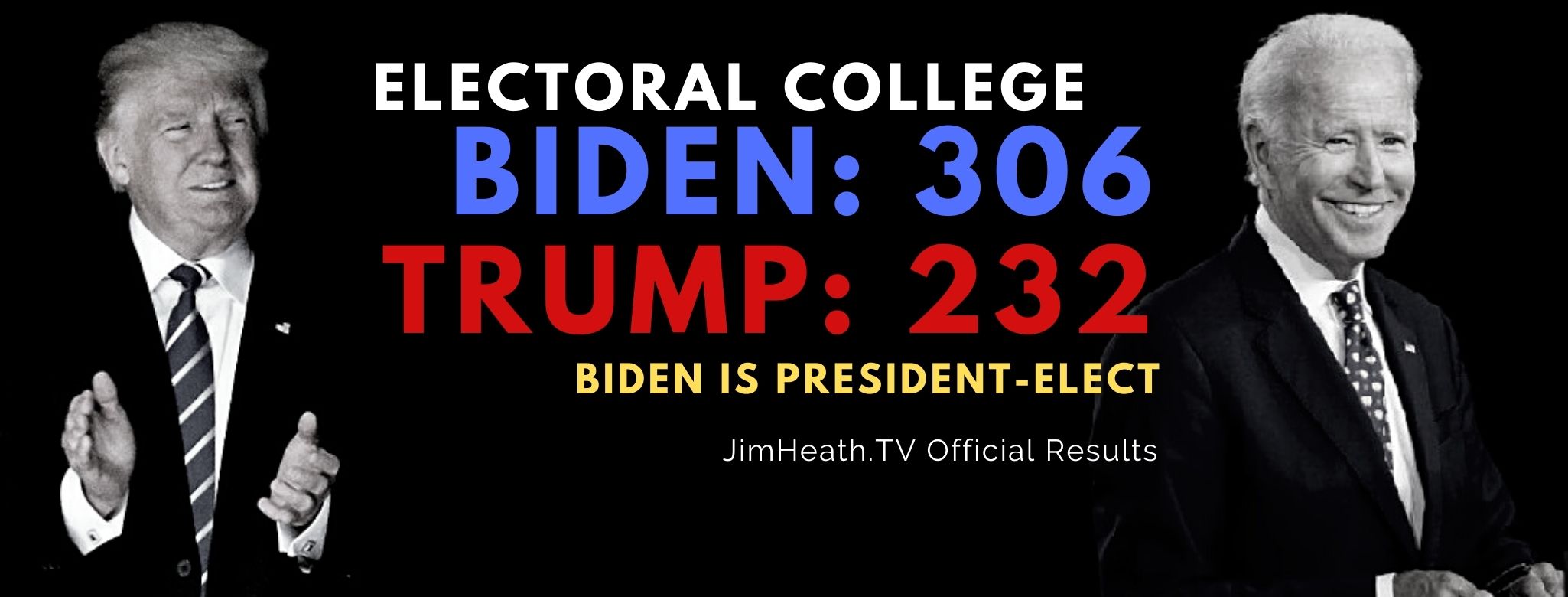A federal judge has thrown out a loony lawsuit that had sought to give Mike Pence the power to overturn the presidential election during a formal count of the votes next week.
Texas US District Judge Jeremy Kernodle, a Trump appointee, on Friday dismissed the suit, ruling that the plaintiffs had lacked ‘standing’ and alleged ‘an injury that is not fairly traceable’ to the vice president.
Texas Republican Rep. Louie Gohmert and Arizona’s slate of GOP ‘alternate’ electors had sued Pence to expand his powers, so that he can solely determine which Electoral College votes to count when he presides over the January 6 session of Congress to make President-elect Joe Biden’s win official.
The Electoral College cemented Biden’s 306-232 victory in mid December and multiple legal efforts by Trump’s campaign to challenge the results have failed.
The suit named Pence, who has a largely ceremonial role in next week’s proceedings, as the defendant and asked the court to throw out the 1887 law that spells out how Congress handles the vote counting.
In a fresh filing Friday afternoon, Gohmert argued that Pence is more powerful than a ‘glorified envelope-opener in chief.’
‘Under the Constitution, he has the authority to conduct that proceeding as he sees fit,’ Gohmert wrote.
‘He may count elector votes certified by a state’s executive, or he can prefer a competing slate of duly qualified electors. He may ignore all electors from a certain state. That is the power bestowed upon him by the Constitution.’
Legal experts have strongly disagreed with Gohmert’s assessment.
In the Thursday night DOJ filing, Pence’s lawyer, Deputy Assistant Attorney General John Coghlan, pointed out a basic fallacy in this case – in order to sue, the plaintiff and the defendant must be in opposition.
In this case, Gohmert and Pence’s interests are aligned.
‘The Vice President is not the proper defendant in this lawsuit,’ Coghlan wrote. ‘The Vice President – the only defendant in this case – is ironically the very person whose power they seek to promote.’
‘A suit to establish that the vice president has discretion over the count, filed against the vice president, is a walking legal contradiction,’ Coghlan noted in a Thursday night filing.
The department said, in effect, that the suit objects to long-standing procedures laid out in law, ‘not any actions that Vice President Pence has taken,’ so he should not be the target of the suit.
‘A suit to establish that the Vice President has discretion over the count, filed against the Vice President, is a walking legal contradiction,’ the department argued.
The dismissal of the suit comes amid reports that President Donald Trump was unhappy that the Department of Justice responded on behalf of Pence in the lawsuit.
The New York Times reported that Trump called Pence Friday morning to express surprise at the development.
The president was more vocal to others about his displeasure, sources told the paper’s Maggie Haberman.
Trump and his allies have filed roughly 50 lawsuits challenging election results, and nearly all have been dismissed or dropped.
He´s also lost twice at the Supreme Court.
On Friday, a number of Michigan’s ‘alternate’ electors filed a brief in the case.
If Trump had won Michigan, these individuals would have been the state’s members of the Electoral College.
However, because Trump didn’t win Michigan, the state’s electors are Democrats – and cast their votes in favor of Biden in Lansing on December 14.
In court documents the rogue electors say that ‘with the permission and endorsement of the Michigan Legislature’ they cast votes in favor of President Donald Trump ‘at the time, place, and manner required under Michigan state law and the Electoral Count Act.’
‘At the same time, Michigan’s Governor and Secretary of State appointed a separate and competing slate of electors who cast Michigan’s electoral votes for former Vice-President Joseph R. Biden, despite the evidence of massive multi-state electoral fraud committed on Biden’s behalf that changed electoral results in Michigan, Arizona, Georgia, Pennsylvania, Wisconsin and other states that have also put forward competing slates of Presidential Electors,’ the court document reads.
The group did not have the permission of the Michigan legislature – with Michigan State Police blocking their access to the capitol – but they did have approval from the White House.
On December 14, White House aide Stephen Miller revealed a plot to have separate Republican electors cast votes for Trump in key swing states including Pennsylvania, Georgia, Michigan, Wisconsin, Arizona, Nevada and New Mexico.
‘As we speak, today, an alternate slate of electors in the contested states is going to vote and we’re going to send those results up to Congress,’ Miller said on ‘Fox & Friends.’ ‘This will ensure that all of our legal remedies remain open. That means if we win these cases in the courts, we can direct that these alternate electors be certified.’
This is where the Gohmert lawsuit comes in.
The suit argues that the Electoral Count Act, which was passed in 1887, violates the 12th Amendment, which outlines the procedure for electing the president and vice president.
The amendment, which was ratified in 1804, says that the ‘President of the Senate shall, in the presence of the Senate and House of Representatives, open all the certificates and the votes shall be counted.’
The lawsuit argues that the ‘President of the Senate,’ which is Pence, has the sole authority to determine which votes to count.
‘That, with respect to competing slates of electors from the State of Arizona or other Contested States, the Twelfth Amendment contains the exclusive dispute resolution mechanisms, namely, that (i) Vice-President Pence determines which slate of electors’ votes count, or neither, for that State,’ the lawsuit says.
Legal experts called the reasoning laughable.
Harvard Law School professor Laurence Tribe tweeted that Gohmert effort ‘may be the dumbest law suit of all’ adding that it’s ‘jaw-droppingly stupid.’
‘The idea that the Vice President has sole authority to determine whether or not to count electoral votes submitted by a state, or which of competing submissions to count, is inconsistent with a proper understanding of the Constitution,’ Ohio State University law professor Edward Foley told The Hill.


